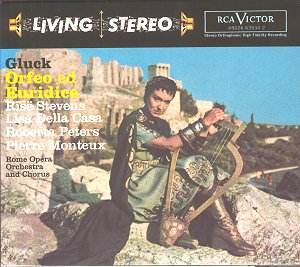Christoph Willibald GLUCK
Orpheo ed Euridice (complete opera)
 Rise Stevens (Orpheo), Lisa
della Casa (Euridice), Roberta Peters (Amore).
Rise Stevens (Orpheo), Lisa
della Casa (Euridice), Roberta Peters (Amore).
Rome Opera Orchestra and Chorus - Pierre Monteux
recorded June 15 - 26th June 1957 in Rome Opera House.
 RCA Living Stereo 09026
63534 - 2 CDs [130.21]
ADD
RCA Living Stereo 09026
63534 - 2 CDs [130.21]
ADD
Crotchet
AmazonUS

We have here a landmark recording of Gluck's most popular opera, which has
been out of the catalogue for quite a while. How does it match up to current
modern recordings, employing period performance techniques? In other respects,
it is a thoroughly modern issue having as it does, three female leads, and
apart from the chorus, not a man in sight.
This performance was based on a world-wide series of performances by Rise
Stevens, started at the Metropolitan Opera and followed on throughout Europe
and America in the mid-fifties. These performances were hailed by critics
and public alike, and this recording was done at the time, capturing the
excitement of the stage performances (so the booklet claims).
Recitatives are accompanied by the orchestra, not by the harpsichord, and
for the remainder of the opera, Monteux has his cast working at white heat
and on their toes at all times. The recording, (made in 1957), is as good
as it could be, given its age. The playing of the orchestra and the singing
of the chorus are both first rate, and the presentation of the set is first
class with comprehensive tri-lingual notes, synopsis, track listing and full
libretto in a full size box, admirably presented.
I should have been bowled over by this issue. The fact that I was not is
more down to me than any inherent defect in the performance. The reason for
my less than full hearted response is the actual sound of Rise Steven's voice.
I am sure that her stage presence, and effect on her audiences was considerable,
but here we are listening to the opera and not attending, and so the
visual element of Orpheo is lost.
My best description of the sound of her voice is that it is very "hooty",
which I find rather off-putting. It is like some of Callas's late opera
recordings, where although the dramatic element of the performance was still
very high, her voice was not very pleasant to listen to. Rise Stevens certainly
does not have as faulty an instrument as late Callas, but for me, I find
that the actual sound distracts me from fully appreciating Miss Stevens'
considerable artistry.
As not all of you will respond in this way, I would recommend that you try
this aspect of the performance out before purchase, and if it doesn't cause
a problem, then go ahead; there is plenty to satisfy you. The other two
performers (Lisa della Casa and Roberta Peters) are first rate, with no criticism
whatsoever about their performances.
The final issue around recordings of Orpheus is the version. The records
state "the work has been stripped of the spurious numbers which have clung
to it over the years. Only music which is certain to have come from the pen
of Gluck is recorded here." This, in itself, is a little confusing, as Gluck
rewrote parts of the opera himself to tailor it to tastes of the time. For
instance, rewriting the principal part from mezzo to tenor and the addition
of more ballet music to satisfy French tastes in the Paris version, and the
named part for baritone for the German version. What is recorded here is
primarily the Vienna version of 1762 sung in Italian, with the ballet music
of the French version added.
John Phillips


